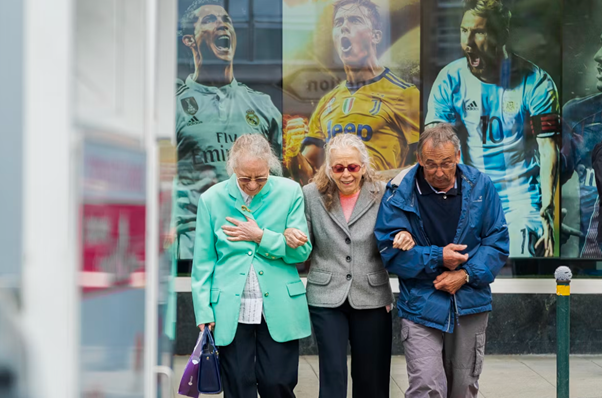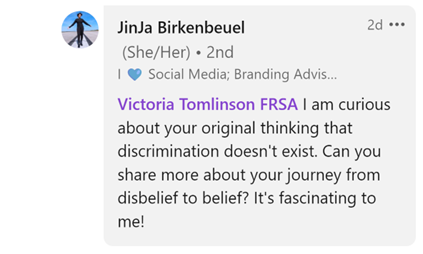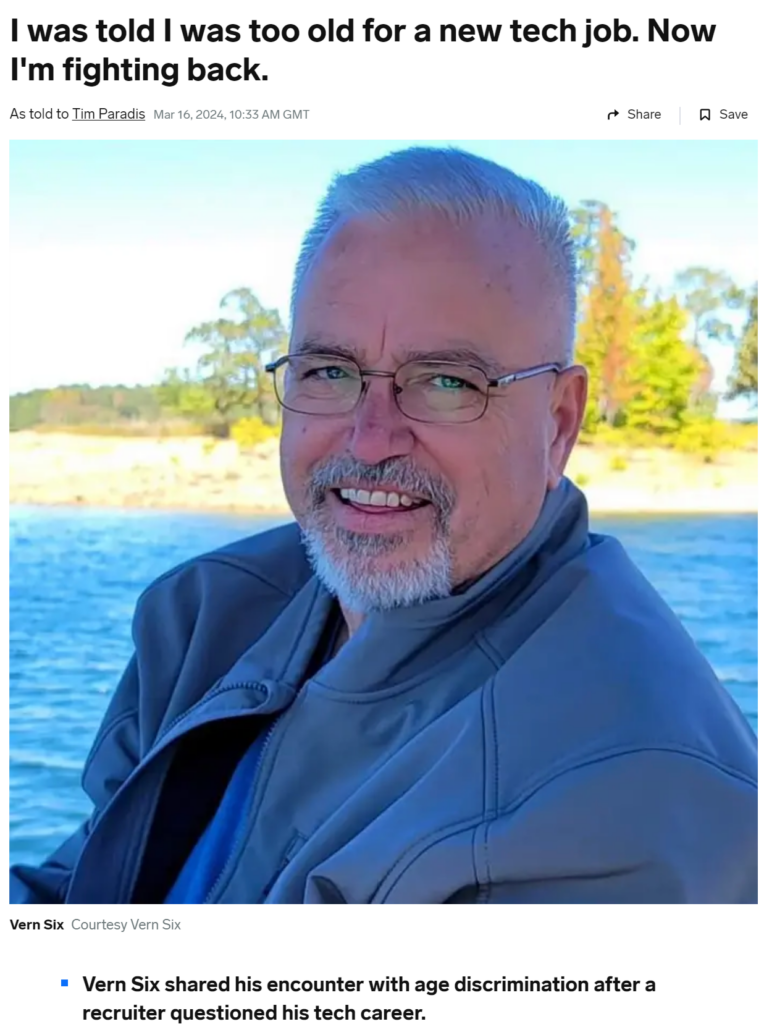Why I changed my mind about Age Discrimination
30 July 2024 By Victoria Tomlinson

People aged over 50 say they can’t get jobs. Tens of thousands of them. I used to think these people weren’t helping themselves. But over the last year or two I have changed my mind. It is quite clear to me there is rampant ageism and age discrimination.
But what made me change my mind? I am writing this because I recently mentioned this change on LinkedIn and JinJa Birkenbeuel, a New York journalist and social media adviser, asked me – would I share more about this journey from disbelief to belief.

Why didn’t I think age discrimination existed?
Let’s start with what I used to think and why. These were the main reasons
- I guess I was influenced by never having experienced ageism myself – or being blithely unaware if I had! But I have had my own businesses since I was 35 and you have to stay ahead of the curve if you run a business and I was generally seen as being a slight futurist
- A lot of my thinking came from having seen my generation – and older – of business leaders who had dismissed social media as naff without understanding it. And they made multi-million pound decisions about new technologies without having a clue as to how it would work or its knock-on impact on the business. I remember buying a dozen books on search engine optimisation to read on a holiday to understand more about social media. Maybe that was extreme but I felt these leaders needed to make some kind of effort to get into tech generally – and at the very least not be arrogant. Just because they didn’t understand a lot of this didn’t make it stupid
- I started seeing a lot of people working in corporates who were frankly worn down. I am not sure what the chicken and egg was of all this – were they feeling ignored at work which made them disheartened and low energy? Or was a lifetime of corporate bureaucracy what made them seem old and out of it?
Whatever the reasons, I was seeing a lot of people aged 50 and more, who seemed ‘old’ and worn out in their behaviours, were happy to say ‘Oh, I don’t do tech’ and weren’t grasping opportunities with energy and learning about new things.
I felt they weren’t doing themselves any favours and could understand if younger colleagues struggled to work with them.
I was re-energising as my generation was winding down
The truth was that as my peers were winding down, I had never felt so energised. I could not understand what was happening and why my age group generally were not enjoying work and life more.
Despite my irritation, I could see these people had considerable skills and experience of value to society. I launched Next-Up to help them adapt and use those skills in new ways. Through all the challenges of starting a new business and creating a new market, I was having the time of my life. I wanted the same for others. But what were the issues?
What started this change of mind?
It took a while for me to understand what was happening in the wider world around age discrimination. I began to hear individual stories of people in their 50s failing to get interviews, let alone jobs. I rather arrogantly thought this was down to their lack of tech skills – not just their lack of confidence but almost a pride in saying they didn’t do tech. The world is now tech-based or enabled. They were out of touch. Of course an employer wouldn’t want them.
I can’t now remember the order of things, but a number of events brought me up short in my thinking and started the evolution
- I did an interview on GB News (not understanding how controversial this channel was). I openly shared the interview on my LinkedIn profile and wham! I could not believe the number of middle-aged men who shared stories of trying to get jobs and completely failing. People praised me for being a ‘breath of fresh air’ and talking about the skills and experience of the 50+ generation that society isn’t using. I had been talking about people who had retired but these (mostly) men brought the issue into sharp focus. It wasn’t about retirement, these were men in their 50s who wanted and still needed to work. I was deeply shocked. I could see this wasn’t just about tech – though it probably was part of the issue. They were experiencing deep-rooted prejudice
- I did a TEDx talk on ‘A Generation of Wasted Talent’. It’s had 20k views. Again, I was talking about people in retirement wanting to be useful still. Again, the flood of responses were more from people of working age wanting to get jobs and not finding anyone to employ them
- We then did a piece of consultancy for a major corporate. They wanted to know what a great workplace for the 50+ generation would look like. And then I heard a phrase which chilled me to the bone. One organisation casually referred to this generation as ‘permafrost’
- We went out to employers large and small for this research, to find best practice. And then it really hit home. Yes there are a few examples of employers really appreciating the 50+ generation, but for the most part they are seen as a problem. Yes, I am sure this tech issue was part of that. Yes, I think a lot of people who have worked in corporates for a long time are demotivated and in turn not being a great ambassador for the benefits of this generation. But what we started to hear and see went way beyond anything I could have imagined
- Lewis Silkin then asked me to give a talk on 50+ issues to an HR Round Table – looking at future workforces. I blithely rattled off the benefits of this generation, the need to be intergenerational and more. And could not believe it when a male HR Director, who looked about 35, said, “I dismiss any CV if someone has worked 20 or 30 years for one employer”. What? Never mind if they were promoted many times, moved into new areas regularly, were a tech whizz or whatever. What is this if not implicit age discrimination?
Is Vern Six the ultimate proof of ageism?
By now I needed no persuading. I had seen and been sent a stream of research showing that employers are deeply prejudiced about older employees. Vern Six went viral when he told his story of age discrimination in corporates – and he was in tech for goodness sake!

The 58-year old had worked in tech for more than three decades as developer, senior engineer, principal software engineer and almost always hired as an independent contractor.
When he was laid off, he updated his LinkedIn profile, showing he was open for work. One recruiter said, “With 37 years in this business, I’m surprised you’re not a CTO.” He then went on, “That’s going to be a hard sell. I don’t even know if I can pitch you to any of my clients. They’re all going to wonder why you’re not a CTO or at the C-level.” Vern says his response was, “Did you just say that?”
As his post went global with 3.4m views and 121,000 comments (including mine), he discovered what I had. Ageism and age discrimination is rife. Stories poured out of recruiters asking candidates to remove ten years from their CV – even when their experience was current and relevant to employer needs.
So this was my Damascene journey. I started out wanting to show the world that a generation of retired people is wanting to work, add value and use their skills. And discovered the world dismisses the experience of people aged over 50 generally.
I have had my own prejudices in this – some have been right but it is a much bigger problem than I ever imagined.
We have to use the skills of the 50+ generation
So Next-Up’s mission is now not just to use the skills of an unretired generation but experienced people in general. In a later blog I will share how we are doing this, what’s working and where the challenges are still.
Thanks JinJa for asking the question. Would love to hear your views on this!
We have to change both perceptions and reality. We cannot have fit and able people declining in old people’s homes – particularly when society desperately needs their skills and experience.


